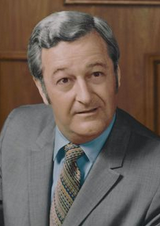I wanted to pass along this obituary in tribute to one of this country’s foremost leaders in championing press freedoms.
By STACY RYBURN
Tulsa World Staff Writer
A lot happened in those after-hours nights when Ben Blackstock, executive vice president and secretary of the Oklahoma Press Association, would have drinks with his colleagues and key figures in the state government.
Those days are largely gone — it’s nearly unheard of that a journalist would opine over drinks with a Supreme Court justice, for example — but Blackstock, who spent 44 years at the helm of the OPA, played a major role in shaping a landscape of transparency in which Oklahoma journalists of today can work.

On Monday, Blackstock died at the age of 90. Among those who will miss him dearly is former Gov. George Nigh.
“I just can’t tell you how many times I met with him,” said Nigh, who served as governor in 1963 and again from 1979 to 1987. “I didn’t ‘run around’ with him, but we were together often, and we worked together a lot, and I’m very appreciative of his work.”
Blackstock “retired” in 1995, at which time he went right back to what he had been doing with the OPA — lobbying for freedom of the press, particularly in the interest of newspapers.
He could be a bit pithy, by many accounts.
Even Nigh, who looks back and considers his relationship with Blackstock as more personal than political, saw where his reputation was earned.
“He never beat around the bush, and sometimes he would upset people,” Nigh said. “You always knew where he stood and you always knew what his position was, and you could always count on him.”
Mark Thomas, who took over as executive vice president at the OPA after Blackstock retired, attested to his mentor’s fiery nature. “He wanted everybody to make up their mind on what was right and what was wrong, and he would push you to the brink of that,” Thomas said.
Blackstock would not rest whenever he found injustice, and he had an altruistic heart, by Thomas’ account.
Blackstock often quoted Kansas publisher William Allen White, who said, “The job of the newspaper is to comfort the afflicted and to afflict the comfortable.”
He subscribed to the “therapy of controversy,” believing that people come out better and stronger because of it, Thomas said.
It wasn’t an uncommon thing for Blackstock to see someone on the street and offer him some work.
“He loved those kinds of opportunities to help downtrodden people to get up on their feet,” Thomas said. “’Comfort the afflicted’ — he loved that. He lived both sides of that phrase.”
Were it not for Blackstock, there may never have been an Oklahoma Open Records Act. Freedom of Information Oklahoma Inc. annually honors him by presenting the Ben Blackstock Award<http://foioklahoma.org/awards/ben-blackstock-award/>, which recognizes a nongovernmental person or organization that has shown a commitment to freedom of information.
Thomas spent about six years working under Blackstock on the OPA staff before heading off to become the Colorado Press Association’s executive director.
He wasn’t the only one to follow such a path. During national meetings, there were at least 10 press association managers of other states who had served under Blackstock — the SOBs, or “Sons of Blackstock,” as they called themselves.
When Thomas took over at the OPA, in many minds it was a “dangerous proposition” — but Blackstock was there to see him along the way.
“He always said, ‘I’ve been around long enough to see these old retiring guys screw it up for the new guy. I’m not going to do it. This is your deal,’ “ Thomas said. “He made that happen. He was terrific to follow.”
Blackstock is survived by a son, Sam Blackstock; a daughter, Melissa Blackstock-Edwards; and four grandchildren.
A service will be held at 3 p.m. May 5 at the Oklahoma Judicial Center, 2100 N. Lincoln Blvd., in Oklahoma City.
 Nevada Press Association The best in Nevada journalism since 1924
Nevada Press Association The best in Nevada journalism since 1924